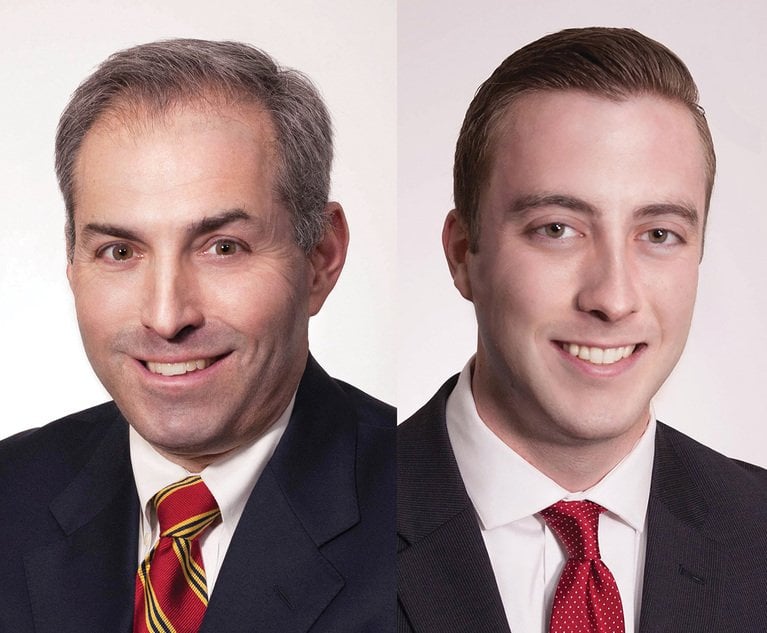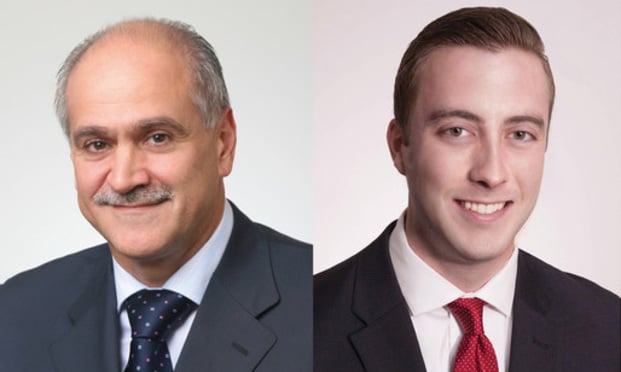Drew S Mcgehrin

November 08, 2024 | The Legal Intelligencer
Membership Has Its Privileges: Bankruptcy Court Examines LLC's Authority to File BankruptcyIn this case, the issue was whether the president was authorized to do so. In a recent decision issued on Sept. 30, 2024, the U.S. Bankruptcy Court for the Eastern District of Michigan examined this fundamental question of basic corporate governance and provided guidance to bankruptcy practitioners who may face similar questions in the future.
By Lawrence J. Kotler and Drew S. McGehrin
8 minute read

May 20, 2024 | The Legal Intelligencer
Always Ask for Permission and Never Forgiveness: Court Clarifies Self-Executing Nature of Certain Nondischargeable DebtsThe Bankruptcy Code has excepted certain debts that are incapable of being discharged as a matter of right, including, without limitation, certain "qualifying" loans used to fund a debtor's education. For a debtor to be able to receive a discharge of such loans, the debtor must file a lawsuit and obtain a judgment determining their dischargeability.
By Lawrence J. Kotler and Drew S. McGehrin
8 minute read

August 10, 2023 | The Legal Intelligencer
Timing Is Everything: Bankruptcy Court Offers Guidance on When a Case Is Considered 'Filed'The Bankruptcy Court thoroughly examined this issue and found that the "upload" time of a bankruptcy filing—and not the time physically "stamped" on a bankruptcy petition—determines when a case is commenced. In doing so, the Bankruptcy Court offered direction and guidelines that debtors and creditors will be well advised to observe in future cases.
By Lawrence J. Kotler, Esq., and Drew S. McGehrin
8 minute read

August 11, 2022 | The Legal Intelligencer
Bankruptcy Court: Willful and Malicious Injuries Will Restrict a Debtor's 'Fresh Start'In re McGinn provides an example of a bankruptcy court's duties to weigh the often competing interests between the general policy of a "fresh start" conferred through a successful bankruptcy case against interests of fairness to parties who have suffered significant injuries willfully caused by the debtor.
By Rudolph J. Di Massa Jr. and Drew S. McGehrin
9 minute read

October 07, 2021 | The Legal Intelligencer
Avoidance Powers Cannot Be Used to Generate Windfalls for DebtorsThe Bankruptcy Code confers upon debtors or trustees, as the case may be, the power to avoid certain preferential or fraudulent transfers made to creditors within prescribed guidelines and limitations.
By Rudolph J. Di Massa Jr. and Drew S. McGehrin
9 minute read

June 25, 2021 | The Legal Intelligencer
Bankruptcy Court: Chapter 7 Trustee Bound By Pre-Conversion Actions of DebtorsAs a continuation of the ongoing disputes that began with a challenged "structured dismissal" in the Jevic Holdings Corp. bankruptcy case, the U.S. Bankruptcy Court for the District of Delaware recently rendered a decision addressing the rights and obligations of a trustee who has been appointed after a debtor's Chapter 11 case converts to one under Chapter 7 of the Bankruptcy Code.
By Rudolph J. Di Massa, Jr. and Drew S. McGehrin
9 minute read

November 12, 2020 | The Legal Intelligencer
Court Opens Door for Widespread Eligibility Under Subchapter V of Bankruptcy CodeIn In re Ellingsworth Residential Community Association, the U.S. Bankruptcy Court for the Middle District of Florida determined that a nonprofit community association engaged in the requisite "commercial or business activities" sufficient to qualify it as a "small business debtor" for purposes of filing a Chapter 11 petition under Subchapter V of the Bankruptcy Code.
By Rudolph J. Di Massa Jr. and Drew S. McGehrin
7 minute read

March 30, 2020 | The Legal Intelligencer
Parent of Secured Creditor Does Not Automatically Gain Secured StatusThis decision underscores the need for precision and care in the drafting of loan documents, particularly with respect to the granting language contained in security agreements.
By Rudolph J. Di Massa Jr. and Drew S. McGehrin
7 minute read

August 15, 2019 | The Legal Intelligencer
Debtors May be Able to Discharge Debts Incurred Through Willful, Malicious InjuryIn TKC Aerospace v. Muhs (In re Muhs), 923 F.3d 377 (4th Cir. 2019), the U.S. Court of Appeals for the Fourth Circuit held that a debt incurred as a result of a willful and malicious injury may nevertheless be dischargeable notwithstanding the provisions of 11 U.S.C. Section 523(a)(6).
By Rudolph J. Di Massa Jr. and Drew S. McGehrin
7 minute read

February 14, 2019 | The Legal Intelligencer
Bankruptcy Court: Trustee Permitted to Step Into Shoes of IRS to Recover TransferIn'In re Gaither,' the U.S. Bankruptcy Court for the District of South Carolina held that Bankruptcy Code Section 544(b) permitted a trustee to step into the shoes of the Internal Revenue Service and employ the Federal Debt Collection Procedures Act to seek to avoid a transfer of disclaimed settlement proceeds.
By Rudolph J. Di Massa Jr. and Drew S. McGehrin
9 minute read
Trending Stories
- 1How I Made Partner: 'Take Every Opportunity to Get Involved in the Business Side of the Firm,' Says Alyssa Domzal of Ballard Spahr
- 2People in the News—Feb. 5, 2025—Eckert Seamans, Rawle & Henderson
- 3Librarian's Termination Violated First Amendment Protections, Lawsuit Claims
- 4Choice-of-Law Issues as the UCC 2022 Amendments Come into Effect
- 5Six Benefits of Taking an Opposing Medical Expert’s Deposition



